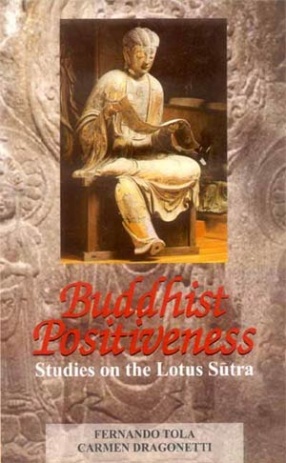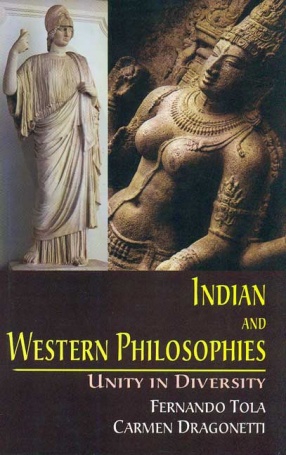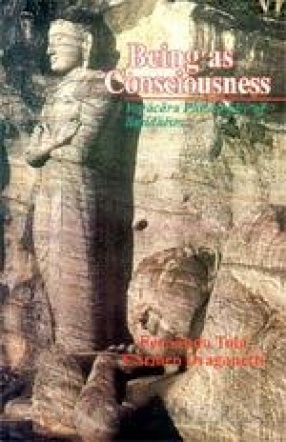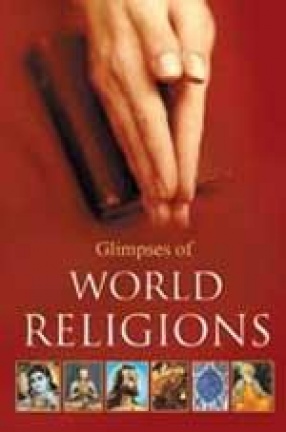The Lotus Sutra is one of the Buddhist texts which can give a real Idea of the force, originality, influence, and value of the Buddhist Positiveness. This essay on Buddhist Positiveness was originally written (in 1994) by Fernando Tola as an answer to the Catholic Pope's criticism of Buddhism, according to which Buddhism is a 'negative' religion; and this essay was presented afterwards, in an abridged version, as a paper, in The International Conference of The International Association of Buddhist Studies held in Lausanne, Switzerland (in 1999). The topics which are dealt with in this book are on the conflict of change in Buddhism; the conflict of change in the Lotus Sutra; apologetics and harmony in the Lotus Sutra and Bhavya; sunyata in the Lutus Sutra; some reflections that the translation of the saddharmapundarikasutra (from its original text into Spanish) provoked in the authors regarding some linguistic, semantic and communication problems; the meaning of the infinite numbers in the Lotus Sutra; beginninglessness of the Veda and the Dharma, names of the Bhiksus and Bodhisattvas in the Lotus Sutra; Buddhist spirituality: positiveness in the Lotus Sutra; Buddhism and family; attitudes in regard to food in Ancient India, and some important reviews concerning the Lotus Sutra.
Buddhist Positiveness: Studies on the Lotus Sutra
$45.00
$50.00
In stock
Free & Quick Delivery Worldwide
All orders amounting to US$ 50 or more qualify for Free Delivery Worldwide. For orders less than US$ 50, we offer Standard Delivery at $14 per book.
ABOUT THE AUTHOR Carmen Dragonetti
Carmen Dragonetti has been Professors in the National Universities of San Marcos (Lima, Peru) and Buenos Aires (Argentina). He undertook investigation work of the National Council for Scientific Research (CONICET) of Argentina, in the area of Indian Philosophy. He was Vice-President and President respectively of the Institute of Buddhist Studies Foundation (FIEB) (Argentina); Directors of the Revista de Estudios Budistas (Journal of Buddhist Studies) REB, edited in Mexico; and Overseas Research fellows of The International Institute for Buddhhist Studies (Tokyo). Independently or in collaboration, he has published several books in Spanish on Indian Culture, specially on Indian Culture, specially on Indian Philosophy, as Yoga and Mysticism of India, Philosophy and Literature of India, Mahayana Buddhism; Buddhist Idealism, Buddhist ihilism; several translations into Spanish of important Sanskrit and Pali texts, as Hymns of the Rig Veda, Hymns of the Aatharva Veda, Upanisads, Bhagavadgita, Upadesasahasri, Gita Govinda, Amarusataka, Damodara Gupta, Dhammapada, Udana, Digha Nikaya, Sutta Nipata. In English he has published the Yogasutras of Patanjali and Nagarjuna's Regutation of Logic (Motilal Banarsidass).
ABOUT THE AUTHOR Fernando Tola
Fernando Tola has been Professor in the National Universities of San Marcos (Lima, Peru) and Buenos Aires (Argentina). He undertook investigation work of the National Council for Scientific Research (CONICET) of Argentina, in the area of Indian Philosophy. He was Vice-President and President respectively of the Institute of Buddhist Studies Foundation (FIEB) (Argentina); Director of the Revista de Estudios Budistas (Journal of Buddhist Studies) REB, edited in Mexico; and Overseas Research fellow of The International Institute for Buddhhist Studies (Tokyo). Independently or in collaboration, he has published several books in Spanish on Indian Culture, specially on Indian Culture, specially on Indian Philosophy, as Yoga and Mysticism of India, Philosophy and Literature of India, Mahayana Buddhism; Buddhist Idealism, Buddhist ihilism; several translations into Spanish of important Sanskrit and Pali texts, as Hymns of the Rig Veda, Hymns of the Aatharva Veda, Upanisads, Bhagavadgita, Upadesasahasri, Gita Govinda, Amarusataka, Damodara Gupta, Dhammapada, Udana, Digha Nikaya, Sutta Nipata. In English he has published the Yogasutras of Patanjali and Nagarjuna's Regutation of Logic (Motilal Banarsidass).
reviews
0 in total
Review by Anonymous
Be the first to review “Buddhist Positiveness: Studies on the Lotus Sutra” Cancel reply
You must be logged in to post a review.
Bibliographic information
Title
Buddhist Positiveness: Studies on the Lotus Sutra
Author
Edition
1st ed.
Publisher
ISBN
8120831918, 9788120831919
Length
xiv+272p., Appendices, Notes
Subjects
more by Carmen Dragonetti see more
Being as Consciousness: Yogacara Philosophy of Buddhism
This work is intended to be ...
$19.80
$22.00
more by Fernando Tola see more
Being as Consciousness: Yogacara Philosophy of Buddhism
This work is intended to be ...
$19.80
$22.00
similar bookssee more
Rama Songs in Sanskrit
$60.30
$67.00
The Cultural Compromise: An Application of the Hegelian Dialectic to the Church-Cultural Interface
It is the contention of this ...
$33.30
$37.00








There are no reviews yet.